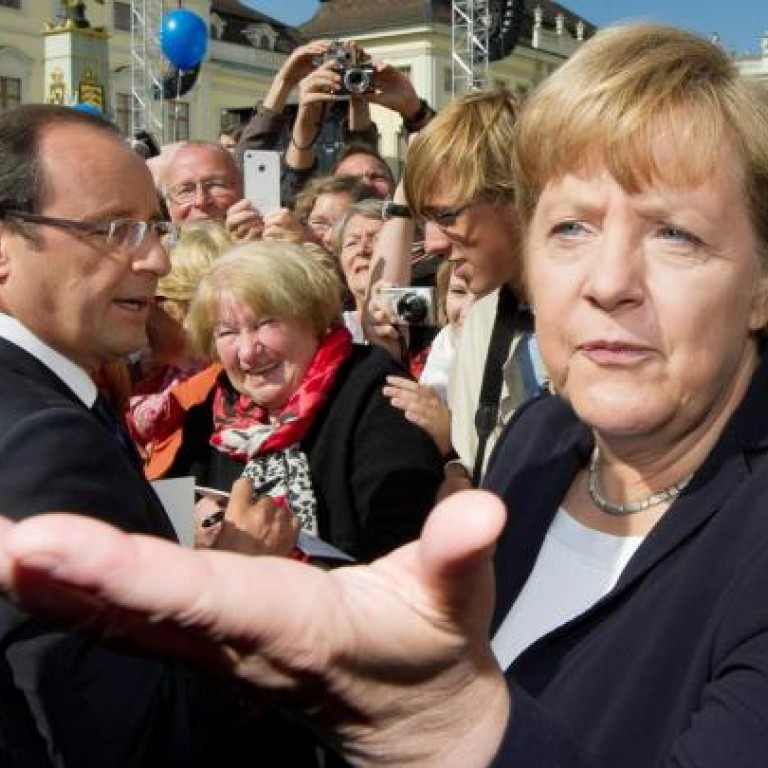
Fresh discord surfaces among euro leaders
Leaders struggle with an agreement on banking oversight, foot-dragging by Spain over need for aid and Greek reluctance to meet commitments
European leaders fear a stalemate as they face discord over a banking union, Greece's endless debate on how to meet bailout commitments and foot-dragging by Spain and Italy on financial aid requests.

Financial markets "that are watching Europe want to see results", Merkel said at the meeting on Saturday near Ludwigsburg, Germany, celebrating the two nations' reconciliation after the second world war. Still, "it has to be thorough, the quality has to be good and then we'll see how long it takes", she said.
Markets that surged this month in response to a European Central Bank rescue plan and clarity over bailout funding may not offer European leaders the time they need as an easing in market pressure raises the risk of policy complacency.
Deadlock over the shape of the banking union could delay until next year a key building block in resolving the crisis, compounding turmoil that has so far engulfed five of the euro zone's 17 nations.
"Complacency seems to have affected European policymakers," Joachim Fels, chief economist at Morgan Stanley in London, wrote over the weekend. "One case in point is the disagreement between governments about the nuts and bolts of a banking union, which remains crucial to break the negative feedback loop between banks and weak sovereigns."
The euro slid 1.1 per cent against the US dollar last week, after gaining more than 4 per cent in the previous two weeks on optimism that ECB intervention and a German court decision allowing bailout funding would help bring an end to the three-year-old crisis.
The differences outlined at the weekend summit underscored Germany's doubts about ECB control of supervision of all banks in the euro area, beginning on January 1 next year.
German finance minister Wolfgang Schaeuble led resistance by a group of northern European countries this month at a meeting in Cyprus against what they view as a rush to common oversight.
Supervision is a condition for direct bailout funding for failing banks, a way around piling more debt on states' books.
Michel Barnier, the European Union's financial services chief, said last week he was confident a compromise could be found on ECB oversight this year, and that he had found "no German resistance" in meetings in Berlin.
Their meeting in the 18th-century Ludwigsburg castle was also the latest in which Merkel and Hollande struggled to find common ground since the French president won office in May on a platform of opposition to Merkel's austerity agenda.
When asked about her relationship with Hollande, Merkel said they were "friendly".
Hollande shrugged off a question about the closeness between the German chancellor and his predecessor, Nicolas Sarkozy, that led to them being dubbed "Merkozy." He refused to bless an equivalent "Merkhollande".
"We don't need to put our surnames together to put a name on European policies," he said.
Another point of contention is the terms on which ailing states should request bailout assistance, with Schaeuble warning against a Spanish application.
He said last week that he was "steadfast" in his opinion that the €100 billion (HK$1 trillion) in banking aid for Spain was enough to see it through.
Spanish prime minister Mariano Rajoy has shown reluctance to seek more help after ECB president Mario Draghi unveiled the central bank's bond-purchase plan, linked to conditions for recipient states, on September 6.
Spanish deputy prime minister Soraya Saenz de Santamaria said last week Spain would consider a bailout if conditions were acceptable.
Rajoy "needs to come to terms with the unavoidable stigma that comes with a programme", said Erik Nielsen, the chief global economist at UniCredit.
With Italian and Spanish borrowing costs having retreated since Draghi's plan emerged, the two countries were unlikely to request bailouts unless yields jumped again, Gianfranco Polillo, Italy's undersecretary of finance, said recently.
"There won't be any nation that voluntarily, with a pre-emptive move, even if rationally justified, would go to an international body and say, 'I give up my national sovereignty'," Polillo said in Rome. "I rule it out for Italy and for any other country."

